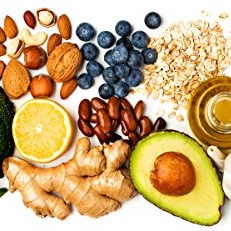| Nootropic herbs, also known as cognitive enhancers, smart drugs, brain boosters or memory enhancing drugs, are neuroprotective. They are used to improve the function of various cognitive abilities, such as cognition, memory, intelligence, motivation, attention and concentration, when they have become impaired in some manner. Nootropics may be used to combat health conditions that interfere with the process of learning, motor control and the maintenance of a healthy emotional state such as Alzheimer’s disease, Parkinson’s disease and attention deficit hyperactivity disorder.
Recently nootropic herbs have become indicated in an increasingly complex world which exerts escalating demands on cognitive functions. Last year (2019) a Dutch institute for brain, cognition and behaviour said strategies to improve the acquisition and maintenance of cognitive skills are thus becoming more and more important on both an individual and societal level. “While people have since time immemorial sought to improve their performance, the present era is unique in that not only the challenges are growing rapidly but so are technologies that promise to meet them. Just like the hacking culture in the realm of computer software and hardware, an increasing number of individuals experiment with strategies to creatively overcome the natural limitations of human cognitive capacity – in other words, to hack brain function.” Thus, not only can nootropic herbs be prescribed for healing but they can be utilised to improve mental functioning beyond what is necessary to sustain or restore good health.
Cognitive enhancement can involve various mechanisms such as:
- increasing circulation to the brain
- providing precursors to neurotransmitters (chemical messengers
in the brain)
- providing usable energy to the brain
- improving neuron function
- preventing free radical and oxidative damage to brain cells
A selection of nootropics are:
Bacopa (Bacopa monnieri): Bacopa is an Ayurvedic herb and has long been used as a cognitive enhancer and brain tonic. It keeps the brain safe from free radical damage and stimulates improved learning and cognitive function.
Ginkgo (Ginkgo biloba): The leaves of this plant are known for increasing blood flow to the brain and greater amounts of oxygen to the tissues. It appears to initiate vasodilatation (opening of the blood vessels) in the capillaries, which accounts for the increased blood flow and thus an increased level of oxygen and nutrients to the brain cells. Ginkgo enhances nerve transmission in the brain and improves the production and usage of neurotransmitters within the brain. It contains constituents which are known to act as powerful antioxidants in the brain, thereby scavenging free radicals which would otherwise cause premature death of cells. In addition, ginkgo promotes the more efficient metabolism of glucose, the brain’s major source of energy. The result of these actions means an improvement in the performance of the brain.
Gotu kola (Centella asiatica): Gotu kola is useful for cognitive and nervous disorders as well as vascular problems in the brain. A recent human clinical study suggested that gotu kola is effective in improving cognitive function after stroke. The study aimed to determine the effectiveness of gotu kola in improving cognitive function in patients with vascular cognitive impairment (VCI). Seventeen people were treated with 1000mg per day of gotu kola, 17 people were treated with 750mg per day of gotu kola and 14 people were treated with 3mg per day of folic acid, all for six weeks. It was found that all trials effectively improved poststroke VCI. Gotu kola was shown to be more effective than folic acid in improving memory.
Lemon balm (Melissa officinalis): Lemon balm can improve cognitive performance and mood and may be a valuable adjunct in the treatment of Alzheimer’s disease. The cognitive and mood effects of lemon balm were assessed in a randomised, double-blind, placebo-controlled, balanced crossover study. The most notable cognitive and mood effects were improved memory performance and increased calmness for a 1600mg dose.
Rosemary (Rosmarinus officinialis): The ancient Greeks used rosemary for stimulating the brain and assisting memory. Ophelia mentioned rosemary in Shakespeare’s Hamlet: “There’s rosemary, that’s for remembrance.” Research indicates that moderate doses of rosemary, as well as the essential oil aroma, can have positive effects on cognition and mood.
Sage (Salvia officinalis): Sage is cholinergic which means it affects the neurotransmitter acetylcholine, or the components of the nervous system that use acetylcholine, which is a facilitator of memory formation. Cognitive functions in the brain are improved by increasing the availability of this neurotransmitter. David Hoffman says that over the last 15 years researchers in Europe and Iran (“a centre for good quality, real herbal research with real people not lab animals”) have found the Salvia genus has profound central nervous system properties. “In Gerard, Parkinson and up to Culpeper, sage was seen as something that was used for the pattern of memory loss of old age which can be interpreted as a potential herb for Alzheimer’s disease. It’s now been shown very clearly in animals and humans, healthy and clinically ill, it can work as an acetylcholinesterase inhibitor. It can inhibit the enzyme that breaks down acetylcholine which leads to memory loss in forms of dementia,” he said.
Christine Gozlan
B.H.Sc. Naturopathy
Dip. Herbal Medicine
Dip. Nutrition |

